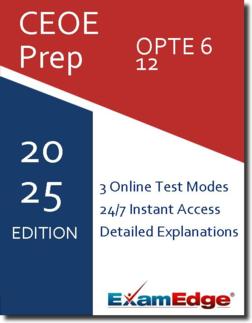CEOE OPTE 6-12 (76) Practice Tests & Test Prep by Exam Edge - Test Reviews
Based on 40 Reviews
- Real Exam Simulation: Timed questions and matching content build comfort for your CEOE OPTE 6-12 test day.
- Instant, 24/7 Access: Web-based CEOE Oklahoma Professional Teaching Examination 6-12 practice exams with no software needed.
- Clear Explanations: Step-by-step answers and explanations for your CEOE exam to strengthen understanding.
- Boosted Confidence: Reduces anxiety and improves test-taking skills to ace your CEOE Oklahoma Professional Teaching Examination 6-12 (76).

CEOE OPTE 6-12 (76) Practice Tests & Test Prep by Exam Edge - Review
CEOE Oklahoma Professional Teaching Examination 6-12 - Reviews
Excellent
Based on
200
reviews
“ I failed the CEOE OSAT Business Education five times before I found your site. After taking all your practice tests, on my next attempt I passed by five points! I can honestly say this site is the reason I passed. Thank you!!!
Jake,
“ The exams are very helpful.
Cherice , Edmond, OK
“ So far no problems
vanessa , Silver Spring , MD
See why our users from 154 countries love us for their exam prep! Including 40 reviews for the CEOE OPTE 6-12 exam.
Exam Edge is an Industry Leader in Online Test Prep. We work with our Institutional Partners to offer a wide array of practice tests that will help you prepare for your big exam. No Matter how niche field of interest might be, were here to help you prepare for your test day.
| 2.8M | 4.5M | |
| Users | Tests Taken | |
| 100K | 19 | |
| Unique Exams | Years in Business | |


